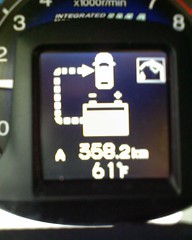 This month’s INC Magazine had an interesting article: “The Connected Car” by Bernard Avishai. The article discussed the potential of an “ecosystem of entrepreneurial businesses” that will arise to service electric vehicles. This new technology is going to need all kinds of new products and services to support it. That’s where the opportunities come in.
This month’s INC Magazine had an interesting article: “The Connected Car” by Bernard Avishai. The article discussed the potential of an “ecosystem of entrepreneurial businesses” that will arise to service electric vehicles. This new technology is going to need all kinds of new products and services to support it. That’s where the opportunities come in.
One such opportunity Avishai pointed out is battery recycling:
Lab tests show that, even after 10 years, Volt [Gen-1 battery] packs will still be capable of carrying 75 percent of their original charge — not enough for the vehicle, but more than enough for utilities to use as storage for bulk renewable energy. [Line director of the GM Volt Tony] Posawatz is excited: “It is easy to imagine warehouses full of used batteries sucking up wind energy and saving it for times the wind does not blow, or homeowners using the pack as backup,” he says. “For recycling entrepreneurs, this means a whole new way of doing business.”
Here’s how I would envision such a company:
Say you have an electric car whose battery is about to run out. You go to our company’s website or call our toll-free number. Then we send over a technician, perhaps behaving theatrically like the way Geek Squad’s (BBY) technicians do for their house calls. Our trained technician removes your battery, provides you with a new one, and leaves with a smile. Then the battery is resold to homeowners or other entreprises who want electric power. When one of those end users calls, our technicians will deliver the battery to them personally as well, though it could be mailed just as easily to save costs.
The benefit to customers? Convenience. They just contact us and we take care of the rest.
The benefit to homeowners or end users of recycled batteries? It’s cost-effective. They get an inexpensive, yet usable battery, plus the good feeling of knowing they’re helping society recycle.
And for doing all of this, we earn a nice profit. We charge a premium for our convenient service. Our batteries may cost extra, but we also handle the chore of recycling the batteries properly to a secondary market – earning even more revenue there.
Our operational costs would come from the website & toll-free number (and perhaps that number isn’t even necessary), the customer & product tracking software, the training classes for our technicians, the vehicles our technicians use (electric, of course!), and other basic business costs (legal, financial, marketing, etc).
Since our company is geographically-bound, we would have to market locally at first. As we streamlined our operations, we could consider a franchise model or company-owned branches throughout the country. We would aim to be a nationally-known service.
Perhaps a partnership could be struck with green vehicle service stations too, if & when those exist. Our services could be offered at such stations as a value-add service. The station can refuel, recharge, and replace your battery all in one location.
And you, as a franchise owner, get to make money with a green business! Everybody wins, especially (and hopefully) planet Earth.
Photo by: bpende